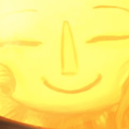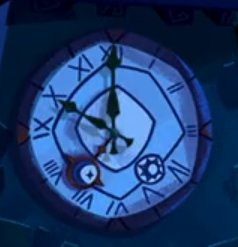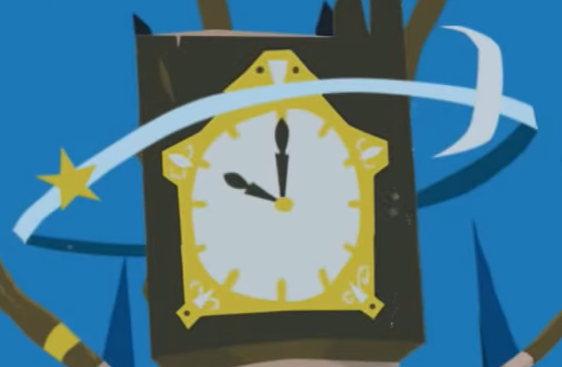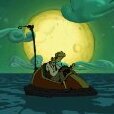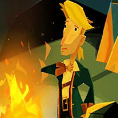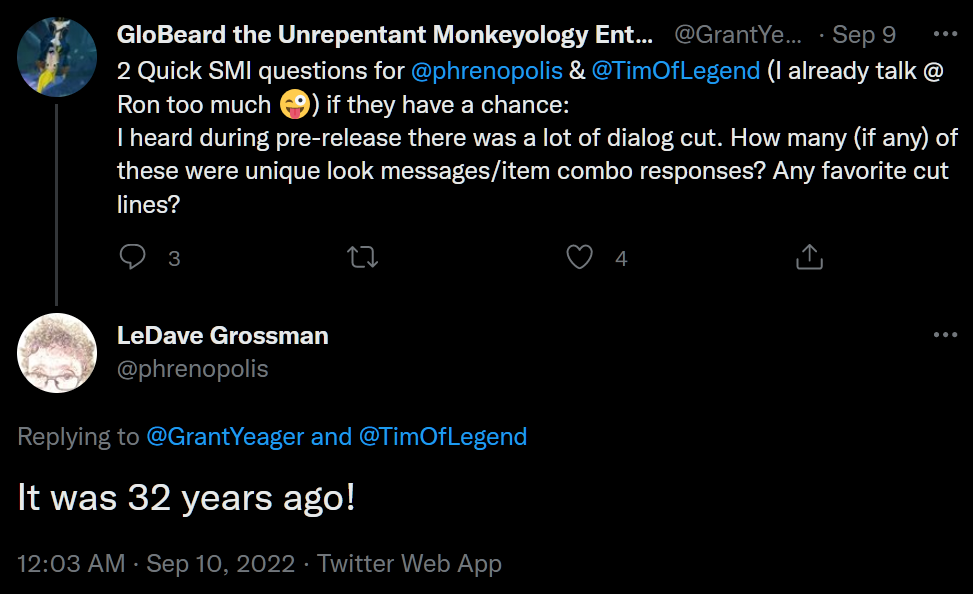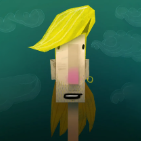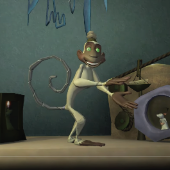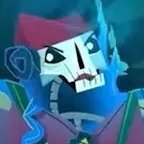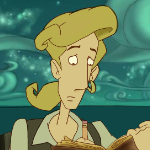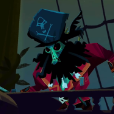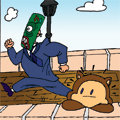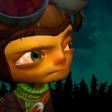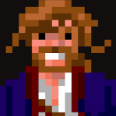Leaderboard
Popular Content
Showing content with the highest reputation on 09/29/22 in all areas
-
The thing is, I don't feel like I've been 'robbed' of the author's take. In fact, I'd go as far as saying that this game, more than any previous Monkey Island game, takes an authorial stance on what Monkey Island is about. That's to say it actually takes some of the vague sense of mystery that we've always talked about the series having and makes comment on it. It doesn't resolve all the mystery, and in fact one of the things that it says very clearly is that tying everything up neatly isn't its goal. It also leaves enough open that yes, it is possible for the player to make up their own mind about what they believe about certain events. But... where I think I differ is that... while all that stuff is super interesting to talk and wonder about (look at all the discussion it's already generated) I don't think any of that stuff is at the emotional core of the game, and the emotional arc of the game is to me what provides the closure. We start with Boybrush playing around and messing with the ending of Guybrush's Monkey 2 story. Boybrush points out that there seems to be a lot unresolved in his stories, and so he starts to tell a new one. And as he tells it, the theme of storytelling, and what's important to a story, what makes a mystery fun, comes up over and over again. At various points during the story, Boybrush interrupts to remind us that this is a story we're being told, and also sometimes to criticise the way that Guybrush is telling it. Over and over again we are warned by different characters in different ways that we might not feel satisfied with the answers when we get to it but we press on, and just when we're about to confront LeChuck once and for all... the game goes all Monkey 2 on us and we're faced with a strange, hard-to-intepret ending. This doesn't satisfy Boybrush at all, and we probably feel a little similar as well, at least the first time through, but Guybrush isn't just going to hand Boybrush a satisfying answer. Or if he does ('rubies and gold!') it's pretty clear to the player that that's the most boring possible choice and probably untrue. I think he wants to teach his child to delight in the mystery of things. To enjoy the not knowing, and the speculating and the chase, more than the prize at the end of it. That, I think, is the emotional core of the story, that's the journey that we go on that has a satisfying resolution, and that was what was playing through my mind as the final shot before the credits lingered.8 points
-
(as an aside I will confess that in my head I thought it was a coin flip whether, as guybrush sat on the bench on his own that we'd get catapulted back into the moment of confrontation with LeChuck... sort of get to enjoy it as a private moment between us and Guybrush without Boybrush there to hear it. On balance I'm glad they showed restraint and didn't try to have it both ways, but if it pleases you, one can imagine guybrush sitting there thinking about what "really" happened past that door)5 points
-
The interesting part to me is that the island wasn't cut because it didn't work for the game but, according to the sign in the game, because of time issues. I hope that the developers will get a chance to properly add Cogg Island to the game, sooner or later, like Terrible Toybox did with two new rooms in Thimbleweed Park. Said that, the moment I saw that modified clock on Melee Island, in the first video clips, I instantly assumed that it had to do with a puzzle. I wondered how the star and moon elements on the clock face would contribute to the puzzle: Well, maybe it's completely a coincidence, but the clock on Cogg Island also has a moon and a star element revolving around it:4 points
-
Based on what I'm reading around, some are. I think that some players were expecting a more "standard" story, less grounded into meta narrative. I really enjoyed reading your comments, but I think that whether or not Guybrush has moved on with the Secret is actually something for the player to decide, not something that the story presents as the only or main outcome. In one of the endings, Guybrush has kept the key to the chest and is watching it. This could imply many things, including that he will never stop thinking about it. I'm biased on this point though, because that's the kind of ending that I like more. The couple seen at the beginning of RtMI is coincidentally identical to Guybrush's parents. If we accept this fact, one might revamp my theory that Boybrush and his friend were pretending that the couple were their parents because they were still reenacting Guybrush's story, which included him and his brother emerging from the underground tunnels into the park. 😛3 points
-
I think that if someone doesn't like too much abstraction from the usual Monkey Island script, it's perfectly OK; we don't need to like the same things. This game, for sure, takes abstraction and implicitness to a very high level. For example, those who would have liked a final confrontation with LeChuck should consider the idea that the confrontation did actually take place and that Guybrush won: The issue is that Guybrush exits from his fantasy before letting the player... play that confrontation or even explicitly observing it. Why I love this idea and I find it a refreshing change from the usual "beat LeChuck" ending, I can understand why some people would just like more of it.3 points
-
I associate this to the gears and machinary of the park. Even if you are in the imaginary world, inside Guybrush's head, you still can hear the gears of the park. This is my interpretation, but it could be what you say too. It would have been interesting to know Cogg Island fully and maybe that would have given some answers to this sentence of Widey Bones. Widey says this too: "No one ever works together. All want their own prize". This could be a reference to LeChuck, Madison and Guybrush wanting to go ahead and have the prize everyone for himself. But it could be a reference to the fans too, because everybody had his own theory about the secret. "The secret smells like popcorn!", says Widey too. And the first thing you find when you are going to know the truth is the popcorn on the floor, when you get out of the door in the alley, in the back of the church at the ending. Yeah, the game is full of phrases with double meaning. After completing the full game, I found that almost every conversation has some link to the ending. For example, at the beginning, when you talk with Stan in the jail, he says that "he gives everybody what they want, although not everybody knows what they want". It could be a reference to how the park gives you the experience you are looking for. If you stay still in the jail, Stan will say random sentences. In one of them, he says: "They say the only real prison is the one in your head". This is amazing when you know about the ending. The curator of the museum explains, at certain moment, that "everybody makes their own connections with the exhibits, and it's highly personal and different for everyone". This could be a reference as how everybody, in the real park, lives his own experience and his own adventure. There are a lot of more links to the ending. The game is full of winks to it. It's greatly written.3 points
-
So I've played the game a second time and I've been stewing on the ending some more, and I think I can pinpoint why I'm finding it difficult to accept. I'm really struggling with the idea that every character we've met, except for Stan and Elaine, are just animatronics. Especially LeChuck. I can't help but feel like the magic has been sucked out of the world by the end, because all of Guybrush's battles with his supposed arch-nemesis feel meaningless if he's not even a real person. I think where I'm feeling the most frustrated is that while the ending seems to be Ron giving everyone whatever interpretation they want, the version where the entire fantasy is completely real is framed as the player being in denial rather than a valid way of seeing things. Idk...could the theme park be a magic place where everything comes to life but the secret turns everyone back into their animatronic forms? That's a theory that could work I suppose. Both Lila and LeChuck who are part of the attraction transform when they enter the door under the monkey head, but because Guybrush lives outside of it he doesnt? I feel like I have to do a lot of mental gymnastics to maintain the illusion for myself, and it kinda bums me out. The other one I've heard is that the minute Guybrush steps through the door it's his older self making stuff up for his son at the end to teach him a lesson about building up mysteries, but then what REALLY happened? I really hope someone can help me find what I'm missing because I've seen such an outpouring of joy about the ending and I just felt like a kid who's just been told Santa Claus isn't real.3 points
-
2 points
-
2 points
-
2 points
-
I've added a few cutscene pieces from Part II and III, that I had already recorded (all in the playlist). And here's also the Scurvy Island Suite, I was working on yesterday: I really like this one! It just puts you in a good mood!2 points
-
👕 I beat #Mojole #191 and all I got was this stupid t-shirt. 3/6 💚💛🖤🖤🖤 💚💚💚🖤🖤 💚💚💚💚💚 https://funzone.mixnmojo.com/Mojole/2 points
-
It would certainly help, but I think the issue is more deeply ingrained than just the abruptness of the ending. It depends. I think it's definitely possible to weave in meta-commentary, but it needs to defer to the conventional narrative. Don't get me wrong, it's not that I think it's impossible to deliver a meta-commentary in a game, or that there is an intrinsic issue with the specific commentary in RTMI. My issue is that the game assigns priority to the meta-commentary to (in my opinion) the detriment of the conventional narrative. I say there was no journey for me because I never found myself particularly immersed in the narrative. Rather than exploring a world and the story that ties it, I felt dragged along through a series of lectures about something that never applied to me in the first place. (Obsession with "the secret") Again, I don't think the themes that RTMI explores are intrinsically problematic. But I do think that had the game been more focused in its themes, and allowed the messaging to take both a subtler and appropriate second place to the conventional narrative, it wouldn't have been an issue for me. The best analogy I can think of is how the anachronistic elements in MI1/2 are brought into focus by MI2's end; they were always there, but are entirely recontextualised afterwards.2 points
-
2 points
-
I like how in escape you give carla and otis cushy government jobs and carla used that to work her way up to govenor while otis is literally exactly where we found him at the beginning of secret. This makes perfect sense for both of these characters to me. Carla is a driven hard working person who will make the most out of what she’s given and otis will always end up being the lazy cowardly thief in a jail cell no matter what opportunities come his way.2 points
-
If I can get slightly personal for a minute, I have severe anxiety and am prone to very intense depression, and it tends to make me value clarity a LOT, because otherwise I tend to overthink, catastrophize, and generally think the worst of any situation. Because there are so many ways to intepret things, it overloads my brain a bit and picking one version never quite sits comfortably for me because it always feels like I'm denying something. Man, I'm really thinking too deeply about a videogame, I suppose it's good that it is so thought-provoking, though it's personally not in a way that feels right for me. Maybe I just need to give it time. I think I'm also in the minority of really hoping this isn't the last game, just so I can close out the series on a higher note for my own preferences.2 points
-
This is from the pre-release thread but it’s still compelling I think, especially given Ron’s cryptic post on Twitter a while back asking why Guybrush arrives on Melee Island via the arch and not via the docks — something he does again in Return. * Archway? Park entrance? * Guybrush and blind Melee lookout stand in the same place as Guybrush and deaf Booty lookout relative to the entrance? * Big Whoop is Booty Town but also not? And in Return now a seaside park too? * Big Whoop ticket desk is Captain Dread’s ship? * Guybrush arrives on Melee expecting weenies, which happen to be next to the Big Whoop entrance? * You also start Monkey Island 2 next to a weenie shop?????1 point
-
A formative event in my young adulthood was watching the DVD commentaries for Monty Python and the Holy Grail. Cleese, Idle, Gilliam, Jones, and Palin were spread across two different commentaries, you see. At one point, a couple of them are laughing and remembering as a new scene comes up. They start quoting the scene. And they quote the scene wrong. They quote the scene wrong, a bunch. A little part of my fanbrain is still working it all out. But it was formative for me in realizing: these creators have given us tremendous gifts and shown immense brilliance in creating them. In many cases, it has been a labor of love and a bit of their lives. However, it has not been the entirety of their lives. Because they are healthy humans, it was not even the focal point of their lives. It was a job... maybe a job they enjoyed, and maybe one that they still remember fondly. But it was a career and a creation - it was not a hobby. If you played Sonic the Hedgehog, then Sonic Mania is safe. Shovel Knight is also good for a hodgepodge of NES feels, but reddit tells me the jury's still out on its latest sequel.1 point
-
Yes, precisely. I do sympathise with my unrealistic expectations (it would be weird if Ron and Dave remembered every detail after all these years, would they have been replaying their own game for 32 years?? -- eek). On the flip side, who else was ReMI for if not the people who have been wondering about the end of MI2 for decades? So it's a balance... When films do this sort of thing, they tend it get it more right... but that's probably because it's much easier to watch and movie and see everything. In games there's a bazillion little branches and obscurities. (Of course, they also often hire fan-experts who point out any contradictions.) I do have to say that the ending of ReMI has possibly made me less enamoured with the series... or I guess I mean it's made me want to move on from it. As I said in another post, I'm starting to feel like a middle-aged man dressed in faux pirate attire sitting on a park bench. My two favourite things in the world (Twin Peaks and Monkey Island) got decades later follow-ups and conclusions. I think I'm a bit done with looking backwards. Maybe it's time to focus on finding new things to fall in love with...1 point
-
Actually the correct answer is boxers... which sort of makes the Special Editions canon 🤔1 point
-
If we read into the retcon that, regardless of how much of the stories actually happened, the games themselves have thus far visualized them as filtered through the lens of Guybrush's storytelling combined with Boybrush's imagination... it tracks that since Boybrush doesn't know what Guybrush's real parents look like, he'd just envision an old couple, and he's probably seen that old couple around before.1 point
-
1 point
-
The fans... What I'm trying to say is: There's some things in ReMI that feel like they came out of not knowing the originals well enough. For example choosing to have a bucket and sponge at Stan's Used Shipyard when it's been established that his ships were filthy. Chances are they simply forgot that obscure line appeared in MI1. (In MI1 if you try to claim you work for Stan cleaning his ships ("I clean ships over at Stan's used ship yard"), you're immediately shut down: "I haven't seen a clean ship over there in years." In ReMI: "This is the bucket Stan used to use to clean his ships.")1 point
-
So with Return to Monkey Island now out, headcanons are probably even more in-depth than ever. Return was one of the few games I played that seems to openly embrace and encourage individual interpretations and head-canons. That being said, I thought it would be cool to have a thread to discuss headcanons just in general. Not just about this game and its themes and endings, but how it's framed the entire series for you. Anything from Secret to the Voodoo Lady's agenda. Below is my (current) headcanon for the entire series. TLDR: Not important enough, just feel free to share your own headcanons. ----- The entire series is largely real, not fantasy, though embellished here and there by Guybrush and the reimagining of his son, which I personally view as the framing of every game in the series until Return, where Guybrush steps in as the unreliable narrator. Guybrush was an orphan, abandoned by his parents and bullied by his peers for his name and only found solace in a pirate themed amusement park/carnival. He was attracted to the pirate lifestyle as it seemed to be exciting and a way to make a name from himself. Once he was old enough, he finally decided to pursue his dream, dropped out of school, and left for Melee Island to become a pirate. Not too long ago prior to this event, LeChuck had met Elaine while he was in Melee to recruit for his expanding crew and pick up Voodoo supplies. Upon becoming obsessed with Elaine and being told to drop dead, LeChuck approached the Voodoo Lady and asked what it would take to win Elaine. She informed him the Secret of Monkey Island held many rumors of promises, enticing LeChuck to embark on a journey to find the secret. A few days after setting sail, the Voodoo Lady conjured up a storm that destroyed his ship and then influenced a trio of sharks to rescue him and wash him ashore on Blood Island. The Voodoo Lady was keen to contain the more dangerous forces of voodoo in the Caribbean and saw LeChuck as a means to absorbing them so they can be collectively neutralized by another individual, who she eventually saw in Guybrush. She was manipulating their battles to not only contain the dark forces of Voodoo, but to also compel one of them to finally unearth the Secret and lay the mystery to bed once and for all. The Caribbean had pockets of voodoo energy that converged from the Crossroads in several areas, such as Terror Island, the Rock of Gelato, the swamp on Lucre Island, but especially underneath Monkey Island, which was demonic energy and pure evil in nature. In the course of his adventures, Guybrush tried to make sense of his parents leaving him, even having a disturbing dream in MI2 that was indicative of them leaving him when he needed them the most. By the end of Return, Guybrush left the secret behind him, which was nothing more than a T-Shirt. In reality, the Secret was that Monkey Island was a convergence of multiple dimensions and pockets of time, with one being the gates to hell itself (Big Whoop). Both LeChuck and Guybrush actually knew the secret the entire time since the first game, but since it wasn't clearly labeled, they didn't think it was the Secret and believed they never truly discovered it. Stan used this to his advantage to make a fake secret as part of a marketing ploy, but the true scope of his profit scheme never came to fruition due to his various legal predicaments. In the end, LeChuck lost the faith of his entire crew and was enveloped by the promise of the secret, fighting for eternity in hell over an empty promise of power and wealth. Stan used the many adventures of Guybrush as inspiration to create a new theme park based off his adventures and the various characters. Guybrush became his best customer and the two became legitimate friends, to the point that Stan trusted him to shut down the park. The park was based off each game, with the prize for Big Whoop being an E-Ticket and the Secret being a T-Shirt (as was Stan's ploy before the park as well). Guybrush, having done enough adventuring for a lifetime, semi-retired from piracy and became a flooring inspector, with him and Elaine pirating as a vice. They wanted to start a family and had a son. Guybrush often told these tales (Tales of Monkey Island) to his son, embellishing here and there, with his son also taking liberties at times. Guybrush combined his tale of the Secret with Stan's carnival, finally taking his son there himself sometime later. The Voodoo Lady, having finally achieved her purpose of containing the darkest of voodoo energies and closing the door on the Secret, also retired and worked at the amusement park, perhaps even spending her time off searching for De Cava and finally reuniting with him. In the end, Guybrush gained everything he wanted, but only through immense hardship that showed him what really mattered (like the Voodoo Lady once said in Tales, her guidance may very well have saved Guybrush from himself). He now has a family and became the parent he always wanted his parents to be for him. He forgave them, but vowed to always be there for his own family no matter what. ---- Other pieces of my head canon: Herman was Elaine's maternal grandfather. His real name was Haratio Torquemeda, but took Marley as his last name when he married Elaine's maternal grandmother. It would fit with Escape's narrative of Guybrush as being seen as Marley. LeChuck is truly not Guybrush's brother, but his original name was Charles and nicknamed Chucky. He renamed himself to LeChuck when he became a pirate. LeChuck's voodoo priest was something of a mentor to him in younger years and instilled within him a drive for power. He would later recruit him into his army years later when he became a fearsome pirate. The five death tarot cards in Curse weren't just referring to Guybrush faking his death twice in that game, but also his murder at LeChuck's hands and Elaine spraying his ghost with voodoo root beer in Tales, and him being declared dead in Escape.1 point
-
I just want to say, I really love this interpretation. It's the "Night at the Museum" theory. Would be cool if everything came to life after dark after Stan closed up shop and handed Guybrush the keys. Yeah, this is the reason I struggled so long with the ending. I've written a lot about my initial disappointment with the last 5 minutes of the game (it really did feel like a traditional adventure up until that point), and the lack of conclusive answers provided by the devs (which I felt had been promised). It's been buried now, but after pondering about it for some time, I'm quite happy with my own headcanon version and I've been able to make everything "fit" to my own satisfaction (with a few additional tweaks here and there). Personally, I didn't really need a final LeChuck confrontation, although I was surprised at how abrupt the ending came. I do like the fact that we follow LeChuck through that final door with the anticipation of a climactic battle, and then our perspective changes completely (similar to the ending of MI2). It is sad though that LeChuck does not appear to be a real person within the park and is only the source of Guybrush's wild imagination, which does take the wind out of my sails. I still maintain that he was partially inspired by his adopted brother Chuckie (and bears a striking resemblance), who possibly vied for Elaine's affections at some point, but it's not the same. Anyway, those 10 variations on the ending really helped me to move on, since it gives you loads of new ways to interpret what happened and also gives some indication of where things "stand" with all the characters at the end of the game. My OCD and desire to know everything gradually lifted over the past week (has it only been a week?), and now I can accept all the evidence as presented.1 point
-
1 point
-
I think @Jakesaid it best a few days ago. The lack of a confrontation with LeChuck in some ways showed that Guybrush was finally free from this perpetual state of constant rivalry with LeChuck. At the end of Tales, Elaine claimed Guybrush was finally free from his fate with LeChuck. In a way, this game proved that. Guybrush didn't need another showdown with LeChuck to win. He simply moved on in a way. I was initially a little disappointed that there was no final confrontation with LeChuck, but once I saw that short epilogue with LeChuck fighting over a meaningless chest in hell, that's all I needed. We've had five games of the typical showdowns: this one was a nice departure and a meaningful one too in my opinion. Guybrush moved on in his life and past his battles with LeChuck and obsession with the Secret to start a family, while LeChuck was consumed by it and stuck fighting for something that would not advance any of his plans in the slightest. Throughout the game, and specifically his diary, it's clear that LeChuck was in denial about how much his hatred for Guybrush drove him along with the Secret. His attempts to claim that Guybrush was more obsessed over the Secret seemed like he was projecting his own obsession onto him. In the end, Guybrush was able to move past it, while LeChuck was consumed by it. Even his animatronic is stuck in that perpetual state, which compliments his epilogue perfectly in my opinion.1 point
-
I think they missed a trick by Guybrush not having a direct confrontation with LeChuck. It was nice popping out in the Melee again... but given that we've seen that trick before, it might have been better for Guybrush to finally kill LeChuck, only for him to fall over like a cardboard cutout. Or something like that. Anyway, the more I think about it, the more I see it like this: Ron is Guybrush on the bench, and we're Boybrush getting sucked into his tales.1 point
-
Interesting. The way I took it the whole scene on the bench was still part of his carnival fantasies. The story was over so it was time to go 'wake up' and go home. Part of my interpretation of the long pause was that the adventure Elaine whispered in his ear will have to wait for another park visit. Anyone else think that Boybrush and the entire prologue was still part of the "adventures" that Guybrush was having at Stan's pirate adventure park?1 point
-
I certainly understand that, I'd just argue that... looked at on that level the game isn't doing a LOT different to MI2. It avoids a direct showdown with LeChuck but essentially it's doing a similar thing of cutting away to weirdness instead of completely finishing the story we were just being told. It's arguably more resolved than MI2, because at least here there are other forms of resolution and not simply a big old WTF that's left hanging there free of any context. I feel like ReMI's ending could possibly be accused of being unoriginal in the context of MI2 (I don't believe that, I think there's enough different stuff happening, but I can see the argument) but I don't see the argument that what they do here isn't Monkey Islandy enough. Whenever the topic of whether things would be tidily resolved came up in the old thread SO many people predicted it wouldn't, even lightly mocked people for suggesting it would. We half-expected a weird end. Heck, we might have even whole-expected it. So when we get one, I feel like it's hard to argue that it isn't on-brand enough. Basically I respect people wanting more of a resolution, but I don't get why they expected one.1 point
-
We've talked about this interpretation a few pages back. I really like it actually, but I don't think I'm quite there for it being my interpretation, mainly because I feel like I like the reveal at the start to be so strongly implying a journey from fantasy to reality that I don't think I want it to be 'actually, it's just another layer of fantasy'. Maybe that could be really cool, but I don't think the game sets up enough stuff to make that cool. I remember feeling similar about the end of the second Matrix movie, when Neo does all the magic-looking stuff in the real world. I thought 'if the 3rd film addresses what happens here well, it'll be really cool,' but in the end it barely even addresses it. So as of right now at least I prefer to take the park, Elaine and Boybrush at face value. I love the IDEA that there could be even more to it, but I need a little more scaffolding around it.1 point
-
Has anyone considered that Guybrush might be the only 'real' character in the entire game? If you follow the orphaned boy theory, isn't it strange that Elaine and Boybrush are by his side until the end, after which they leave and he sits there alone? Having myself been in therapy, I know how easy it is to set up coping methods for the problems that surround you, and for me, escaping into game worlds has been one of them (just like it is for Guybrush if you follow this theory). If you believe that the whole game is a form of therapy for Guybrush, and letting his obsession with the secret go is the goal, wouldn't it be likely that Elaine and Boybrush are his coping methods, and that's why they leave him? - Boybrush: He could be the inner (rejected) child of Guybrush that needs comforting. Being nice for your inner child means you'll learn to have compassion for yourself and is the way to dealing with your patterns and problems. After which you 'fuse' with the inner child and can just be nice to yourself. - Elaine: She's more like a counselor in all of this. She's way too nice to Guybrush to be a real person. She doesn't care that he does horrible things to people and places (even her beloved Mêlée Island mop tree). She does not judge him, listens to him and asks him questions about his actions (or maybe patterns?). She's more of a psychologist than a wife. This way, when Guybrush is 'healed', he doesn't need Elaine and Boybrush anymore. He's at peace with himself and the world around him. And he ends up alone on a bench and is completely fine with it. Looking at it like that through the lense of my own journey, it might be the most beautiful ending imaginable.1 point
-
I basically posted mine already so here it is again, with a few modifications now I've had some more time to think about it: In the real world (or some slightly more piratey approximation of it) Guybrush visits Stan's carnival as a kid, and goes back every year, imagining himself having all kinds of adventures there. He doesn't quite grow out of it, but he does meet Elaine along the way, who used to appreciate it in the same way he did but has sort of moved on. She tolerates his fascination with the place but nowadays doesn't go out of her way to nurture it. In the park, there is a sort of treasure hunt, every year, but usually Guybrush either comes away empty handed or doesn't take away the biggest prize. His obsession with this does cause some tensions with Elaine over the years, which we see in MI2, but she comes to tolerate it. Elaine and Guybrush perhaps go on various real-world treasure hunting adventures, but they never really do anything on the same big, grand scale of Guybrush's imagined adventures in Stan's park. They start a family, and this becomes a new priority in Guybrush's life. He stops visiting the park every year, but he does keep it alive through the stories that he tells his son, which are a mixture of his real adventures with Elaine, and embellishments that he tells, inspired by the times at Stan's park. His son loves all the stories, and he often play acts them with his friends. Like many kids around his age, he has an idealised version of his father, which Guybrush does little to discourage. Where ReMI starts is during one such thing, and we get to see Guybrush telling his son another heavily embellished tale of his old adventures. At the end of the story, for reasons, Guybrush changes tack and reminisces about his very last visit to Stan's park, the one where he stays very late, determined to finally find the secret for himself. This, he does, or doesn't do depending on the player's choice. At the end of the story Elaine tells Guybrush about a new little adventure he has planned, but before we cut to credits we get to see Guybrush reminisce one more time about his younger days when anything seemed possible, and feel content that he's passing some of that spirit onto his son with his stories. Other bits: the LeChuck we see in the games represents an extreme version of Guybrush's worst tendencies - his obsessions, his disregard for the well being of others in pursuit of his goals. Also, the ending in my head (though not the one I chose for my first play) is that guybrush takes the key, but decides not to open the chest, finally content with the not-knowing.1 point
-
👕 I beat #Mojole #191 and all I got was this stupid t-shirt. 5/6 🖤🖤🖤🖤🖤 🖤🖤💚🖤🖤 🖤💚💚🖤💛 💚💚💚🖤🖤 💚💚💚💚💚 https://funzone.mixnmojo.com/Mojole/1 point
-
Can it be a Monkey Island game, by virtue of being a commentary on Monkey Island games? Still in Part 2, I'm kind of amazed to watch this reality where nobody is afraid of LeChuck (neither the town nor his crew), and he and Guybrush are both suddenly really interested in the Secret of Monkey Island out of nowhere. It's sort of like a dream sequence, an alternative dimension. But when this is over, can I really value a T-Shirt in a chest over that coveted E-Ticket in a chest? That would let me get on... ANY ride. I don't think I've done a MI2 playthrough yet where I've left the Treasure of Big Whoop E-Ticket behind.1 point
-
👕 I beat #Mojole #191 and all I got was this stupid t-shirt. 4/6 🖤💚💚🖤🖤 🖤💚💚💚💚 🖤💚💚💚💚 💚💚💚💚💚 https://funzone.mixnmojo.com/Mojole/1 point
-
Oh, I didn't notice there was an AI-related thread. 🙂 If you are curious, I made a bunch of pirate-themed DALL-E2 images. Putting them here with the corresponding prompts would imply a giant copy-and-paste from the TWP forums, so I'll just link to the thread: https://forums.thimbleweedpark.com/t/a-discussion-with-an-ai/5121/116 Here's an example: Prompt: “Old pirate playing chess with a monkey outdoor, street photography.” Result: That thread contains also one of the funniest discussions I had with Guybrush (interpreted by GTP-3): https://forums.thimbleweedpark.com/t/a-discussion-with-an-ai/5121/201 point
-
I mean, at the end of the day, it's meant to be a joke. I don't think Ron and Dave forgot so much as they simply didn't want to repeat themselves.1 point
-
I missed it too, before reading about it online. (But the nature of the outhouse got my suspicion tingling.)1 point
-
As someone that also struggles with severe anxiety I fully appreciate how you feel. I spend a lot of time thinking about games because my issues constrain my life, and thinking about games is preferable to the alternative. In part it is probably a non-trivial portion of why RTMI frustrates me so much.1 point
-
It's the intrinsic flaw of endings that are intentionally laid open in this manner. From a dev perspective I can see how it might seem like the benevolent move; you're graciously allowing the people to make up their own mind on what happens. But I think the reality of such an approach is it just leaves people feeling unfulfilled. People want to see the author's take on the story, and RTMI robs the player of that due to how insubstantial it is in terms of conventional narrative.1 point
-
I do feel like every game post-Curse treats LeChuck as some sort of Ghost Zombie Demon Pirate, so the best methods for dealing with him are anyone's guess at this point. And yeah, the intro background change is fantastic, I didn't notice when it happened, but just gradually noticed that it didn't look like I remembered1 point
-
I believe Quick and Easy software (aka @bgbennyboy) are on the case! https://quickandeasysoftware.net/software/thimbleweed-park-explorer1 point
-
Giving it to Carla results in an achievement of course One more detail: It feels like Carla was a bit of a dick. She and Otis were castaways together (with Meathook). Years later Otis takes a flower from her garden and she locks him up! Ouch. But how did Guybrush read them in MI2? Yeah, basically the crimes were written across the top. And the name was written on the bottom... which also makes no sense 🤪 The more we discuss this stuff, the more I feel like a middle-aged man sitting on a park bench in faux pirate attire.1 point
-
The hovertext says "Settle accounts with [name]." Guybrush asks, "Do I owe you anything right now?" Locke says something like, "Thanks for noticing." Wally says something like, "Thanks, with all this business I tend to forget about getting payments for small orders like yours." Voodoo Lady says something like, "Much, but not monetary" and doesn't take payment. I don't remember trying the coinpurse on anyone else yet.1 point
-
Same. I like seeing an old piece of dev history and I like that they sank it beneath the ocean. It’s a cool Easter egg. I can’t really imagine how it worked into the finished game, though, and don’t really need to.1 point
-
1 point
-
This may not be a unpopular opinion per se, but this is where this thought fits in the best, I think: Monkey Island fans are some of the luckiest in the world! Why? We have two great games as a base, three really good sequels that are fun and never really boring (you can argue about the story here and there). If you compare that to other game series where there are really bad sequels in between, we've been pretty lucky, I think. And now (TODAY!) we get a sequel from the actual creator, which will reveal the two biggest mysteries of the series. But wait, there's more! In all games we have solid to fantastic artwork, the same main composer with great working partners by his side, great voice acting without replacing the main character etc. And all this over a period of more than 30 years, with no oversaturation (so far), so that every new game was/is an event. Not to mention this great community here! All of this brings me to the conclusion: Yes, we Monkey Island fans are pretty lucky!1 point
-
Well, I probably have a lot connected to EFMI: - I did enjoy the Toothrot-Marley-revelation, as I thought it was a cool connection between the first two and 4 th games. - I'm glad they made the transition to 3D in Escape and had no issues whatsoever with the controls/interface - I loved the whole last act (Monkey Island plus ending... including Monkey Kombat!) and felt it was much more satisfying and epic than the short and abrupt ending of CMI But, I'm only putting those as BillyCheers mentioned the first one. The first thing that actually came to mind, is I actually love the LAs Star Wars games, especially Tie Fighter and Dark Forces, and have played some of them more than some of the adventure games. I just wish their success hadn't killed adventure games... (I know that's a overly simplified version of historic events) Oh, and I really don't see why people like the second MI special edition much more than the first. For me there were too many little details they didn't get correct with MI2, starting with the missing opening credit sequence (Don't get me wrong, I'm still grateful for the SEs in the first place). Oh, and I didn't mind Guybrush's hair from the first SE. This is fun - great topic starter! 😁1 point
-
Ok, you all had loads of fun, but this ends here. This is the real™ official ordered list: 1) MI2 2) MI1 3) CMI 4) EMI 5) TMI That's just how it is. Sorry to be 100% objectively right.1 point



